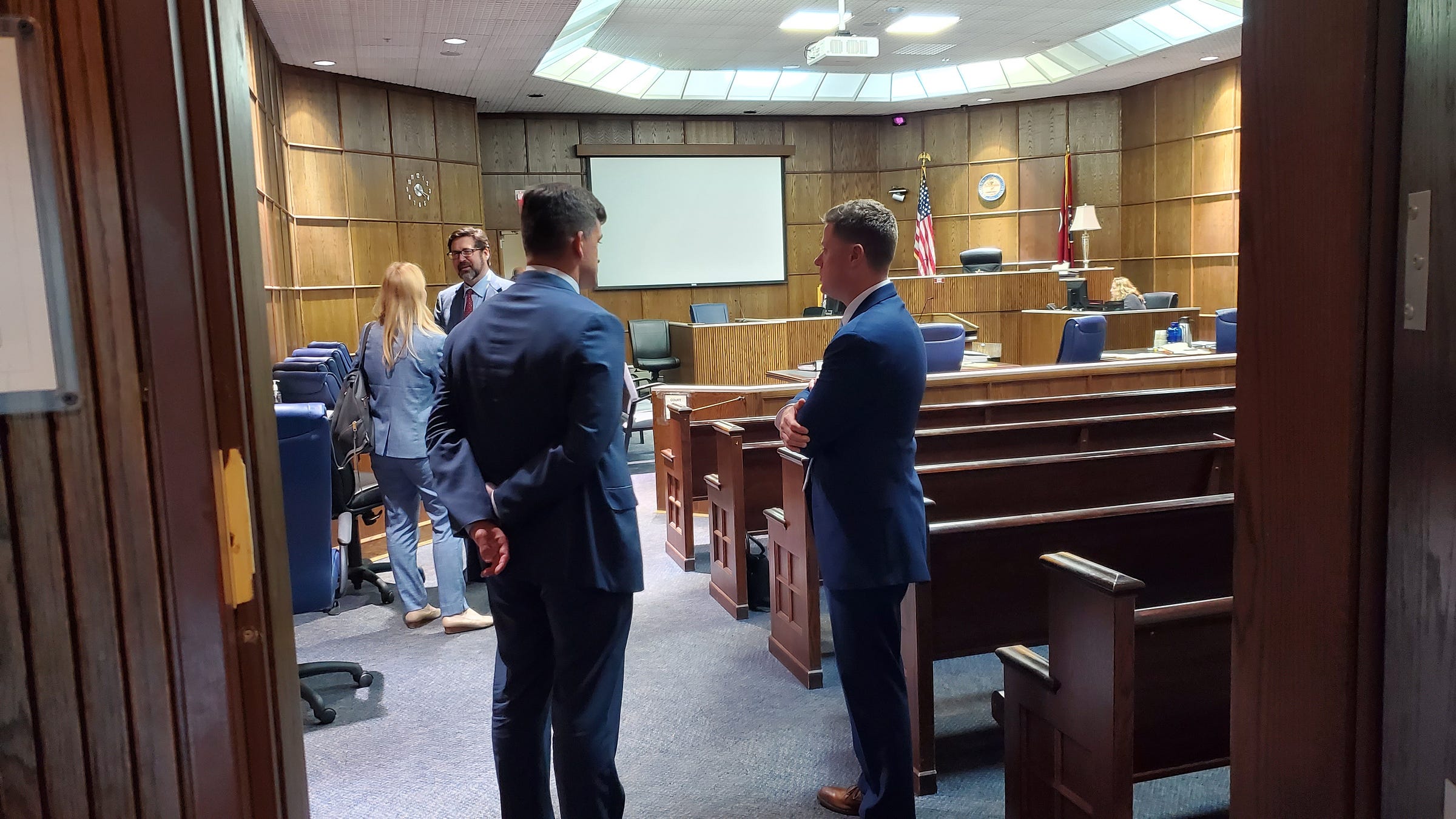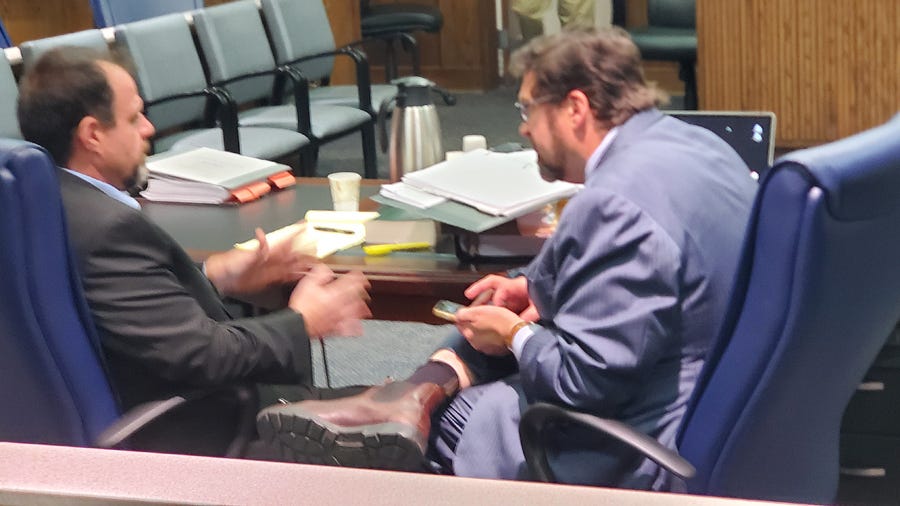Even judge stands when ‘sovereigns’ enter courtroom
Jurors empaneled in Rzeplinski trial, a case against a gun owner accused as 'felon in possession' despite clear evidence that State of Tennessee cured his alleged record.

CHATTANOOGA, Tenn., Tuesday, July 30, 2024 — Judge Amanda Dunn rolls her chair back, stands in her black robe at her dais and watches jurors file past.
Her rising to her feet is not an empty formality in Tennessee on this the first day of the Ray Rzeplinski “felon-in-possession” criminal trial. The fact that all people in the Hamilton County courtroom stand in respect to the jury of 12 explains why “2A Ray” insists on right to trial.
Counting on a fair shake from the citizenry, plumber Rzeplinski faces 56 felony counts and a misdemeanor charge in a drain clog of official misconduct overseen by district attorney Coty Wamp, the heavy lifting handled by ADAs Nicole Evans and soft-spoken Jeff Jones.
These government employees join others in a four-year bid to try “2A Ray,” bringing a superseding indictment switching half a dozen charges into 57 civil death penalty charges. Because Mr. Rzeplinsky refuses to plea bargain, to accept their offers of lenity if only he will admit the allegations, he is on trial for his life, his Ray’s Plumbing business and finances wrecked.
Won’t take two years probation? OK, how about 1,270 years in prison?
Because DA, PDs and the closed union lawyer shop run a plea bargain mill, trials are a rarity. So uncommon are they that attending today are a dozen young attorneys making the public event a learning experience.
Sovereignty is where?
After a break for legal argument, or lunch, the blue-jacketed bailiff vanishes to fetch jurors. The rear door reopens. He reappears, steps to one side. “All rise!” Jurors and alternates cross the threshold.
Everyone stands. Audience members. 2A-Ray. Ben McGowan his attorney. The ADAs. The court reporter. Clerk. Times Free Press reporter Sofia Saric.
That sovereignty resides in the people is a bit of American mythology embedded into the state constitution’s magnificent bill of rights. According to the Word of God, however, sovereignty is wholly an attribute of God. It cannot be shared. God doesn’t share sovereignty, but He delegates power — that being short for lethal force. He delegates power under authority to governments and kings (public execution, war powers), to heads of households (defense of family, corporal punishment, property rights) and to individuals (self-defense), these three authorities encompassing all Christian civiliziation
Tenn. const. Art. 1, sect. 1 indicates that sovereignty — or “power” — doesn’t belong with God but to the people as awholee.
That all power is inherent in the people, and all free governments are founded on their authority, and instituted for their peace, safety, and happiness; for the advancement of those ends they have at all times, an unalienable and indefeasible right to alter, reform, or abolish the government in such manner as they may think proper.
Tenn. const. Art. 1, sect. 1 (emphasis added)
Section 2. That government being instituted for the common benefit, the doctrine of nonresistance against arbitrary power and oppression is absurd, slavish, and destructive of the good and happiness of mankind.
Tenn. const. Art. 1, sect. 2 (emphasis added)
If the constitution is correct, Judge Dunn rightly stands before this affirmation, and the people in whom this “sovereignty” resides, the common citizen randomly selected for jury service.
But she is right and just to stand even if the constitution is wrong, and the scriptures are correct. It’s proper that she stand because the people are the arbiters of law and fact in the Rzeplinski case, and in all others.
The jury has a veto power that is unappealable, unreviewable, and is final. Their veto of the state’s cause is a withdrawal of their consent to the government. They are saying — if they “nullify” the case with a “not guilty” finding of fact and law, they are playing their intended and unavoidable role.
Their role is check upon rogue government, a mechanism to abate lawlessness in uniform, anarchy by those on the public or tax-funded payroll. As jurors listen carefully, they are right to think how important their job is, how vital to the public peace and tranquility.
Dunn’s honorable instructions
Jury instructions at the beginning today are reasonable. Judge Dunn says if there is unanimous agreement that the state has proven its accusations and their conclusion “rests easily” in their minds, they vote to convict. They are to rule not guilty if the state cannot prove its case “beyond a reasonable doubt.” The belief in Mr. Rzeplinsky’s guilt does not have to be an absolute certainty.
She makes clear what material in the proceedings is not evidence, such as opening statements, closing statements and they are to rule only upon “the evidence and my instructions” about the law.
The jury’s job, she says, is to determine the facts from the evidence. Applying law to facts, “You will arrive at the verdict.” Obviously, much remains in play under this guidance. It’s up to the juror to evaluate witnesses, documents and artifacts.
Does witness seem to be honest? Any reason not to tell truth? Does that person have memory of events? Have a bias predisposed to verdict? Are answers clear? Conflict with other witnesses?
She justly states that jurors cannot do any outside reading or research about the case. The reason for this ironclad rule is that a juror’s private investigation and its fruits cannot be cross examined or challenged by one or other sides. The trial arena is the sole source of all relevant facts and law, she says. Jurors can’t “share or receive information” by any — Google, social media, personal contacts, news sites, websites, not even for the definition a word. A juror who finds a word defined online tonight acts illicitly. it is, the judge says, “unfair because parties can’t refute, rebut or explain” the word or concept the juror has investigated.





Judge Dunn is the sister of Alan Dunn who I went to Boyd Buchanan with, but whom I didn't know except that Alan was a basketball player and played football. I maybe saw him in the weight room with me from time to time, but that was it. He seemed like a good enough guy back in 1999 and never came off to me in a bad way.